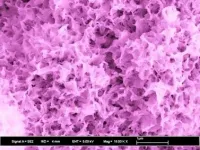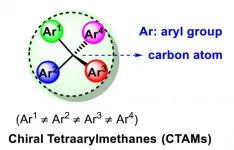"The same core capabilities instrumental to defeating COVID-19 can also defeat diseases that have plagued humanity for generations--such as AIDS, tuberculosis, malaria and Ebola--while targeting emerging pathogens of pandemic potential," said GHTC Director Jamie Bay Nishi. "Developing vaccines in such record-breaking time is, in reality, the product of decades of R&D investments. With smart funding and policy decisions, this foundation can generate a new era of innovations that will protect the health of millions of Americans and billions of people around the world."
The report breaks down the individual and often less-appreciated engines of the U.S. global health R&D enterprise--including critical initiatives within the U.S. Agency for International Development (USAID)--to identify specific actions across the government that can channel President Biden's promise to lead with science and international cooperation, to realize the promise of R&D for global health.
It notes that such investments produce more than just health benefits. They also have a strong track record of creating hundreds of thousands of jobs across the United States and tens of billions of dollars in economic benefits. Meanwhile, the assessment reveals how the rapid development of COVID-19 vaccines is directly connected to work on other global health threats: the Johnson & Johnson vaccine uses a similar approach as the company's Ebola vaccine; the Moderna platform was previously being developed for candidates against other respiratory viruses and chikungunya; and the Oxford University-AstraZeneca vaccine is based on technology from malaria vaccine research.
But the report warns that today, global health R&D hangs in the balance between "broad setback and inspiring possibility." It notes how the demands of fighting the COVID-19 pandemic revealed the enormous value of investing in global heath innovations, while at the same time it has diverted resources and personnel from the battle against many other threats.
GHTC's prescription for rejuvenating global health R&D includes: Doubling support for global health programs at USAID and setting minimum funding targets for R&D within these increases, establishing a new position--chief science and product development officer--within the agency, and funding a new $200 million USAID Grand Challenge for global health security. The report notes that USAID is the "only U.S. agency with a mandate to focus on global health and development." Yet despite USAID's strong track record in delivering high-impact health innovations and an extensive network of partnerships, GHTC found that the agency's unique capabilities have been underutilized and underfunded as part of the U.S. government's COVID-19 response.
Increasing funding for the U.S. Centers for Disease Control and Prevention (CDC), particularly for its Center for Global Health, the National Center for Emerging and Zoonotic Infectious Diseases, and the Division of Tuberculosis Elimination and its Tuberculosis Trials Consortium. The report notes these programs have been "operating on tight and relatively stagnant budgets" and that the fight against COVID-19 compounded the problem by diverting resources and expertise. Meanwhile, the analysis points to the need to revitalize CDC's global health work as part of the broader effort to rebuild an agency that was "politicized and undermined" during the COVID-19 response.
New, targeted funding at the National Institutes of Health (NIH), including more support for product development and translational research for areas lacking commercial interest and steady funding increases for the Fogarty International Center alongside sustained growth for the National Institute of Allergy and Infectious Diseases and the Office of AIDS Research. The report points out that NIH's high-profile work in confronting COVID-19 has highlighted the importance of past investments that have provided the "building blocks of future drugs, vaccines and diagnostics." But it also warns that the pandemic has stymied non-COVID-19 work, "leading to urgent requests for relief."
Establishing a permanent funding line at the Biomedical Advanced Research and Development Authority (BARDA), supported by at least $300 million annually, to support work on emerging infectious diseases, antimicrobial resistance (including drug-resistant tuberculosis or TB), and pandemic influenza. The report finds that, despite its proven value in dealing with a range of threats, BARDA has been overly reliant on "one-off" emergency supplemental appropriations in response to epidemic crises, leading to gaps in its portfolio. For example, BARDA is not involved in research on drug-resistant TB, even though experts have warned that it's a major health security threat to the United States.
Working with the executive office of the president to create much tighter coordination for US-funded global health work. The report calls on the White House to elevate the importance of global health R&D in achieving social justice priorities and to ensure USAID is involved in high-level advisory bodies on the pandemic response. The report found that USAID, despite its significant global footprint, was largely excluded from White House pandemic response efforts in 2020. But GHTC notes that USAID's expertise and partnerships around the world will be essential for achieving the global pandemic response envisioned by the Biden-Harris administration.
Protecting malaria and other parasitic disease work along with TB and antimicrobial research supported by the Department of Defense (DoD). The report pushes back against recent DoD moves to eliminate malaria research programs, noting that such cuts would scuttle decades of progress achieved via research at the Walter Reed Army Institute of Research and the Naval Medical Research Center. GHTC calls on Congress to consider protecting DoD work on malaria--which it notes remains a considerable threat to U.S. troops deployed abroad--with a dedicated funding line. Meanwhile, the report views increased funding for DoD's efforts to develop new treatments for antimicrobial-resistant pathogens as essential to "strengthening global health security by preventing a post-antibiotic era."
Increasing support for key multilateral initiatives, such as the Coalition for Epidemic Preparedness Innovations (CEPI). GHTC believes joining CEPI and committing at least $200 million annually would provide a much-needed boost to an initiative dedicated to developing vaccines against epidemic threats and making them globally accessible. GHTC also seeks a greater role for the U.S. Food and Drug Administration (FDA) in working alongside the World Health Organization (WHO) to provide technical support to under-resourced regulatory authorities that would accelerate access to a range of biomedical advances. GHTC's analysis finds that by embracing a strong action plan for global health R&D, decisionmakers in Congress and the Biden-Harris administration can seize on the possibilities revealed by the work to defeat COVID-19 to launch a new, stronger era of research for neglected and emerging infectious diseases.
"Never has a single disease demonstrated what can be accomplished in so little time with the full resources and focus of the U.S. government," it concludes. "Scientific milestones to defeat many of our world's toughest global health challenges are within sight, and with strong funding and smart policy, these milestones can be reached."
INFORMATION:
The Global Health Technologies Coalition (GHTC) works to save and improve lives by encouraging the research and development of essential health technologies. We bring together more than 30 nonprofit organizations, academic institutions, and aligned businesses to advance policies to accelerate the creation of new drugs, vaccines, diagnostics, and other tools that bring healthy lives within reach for all people.



